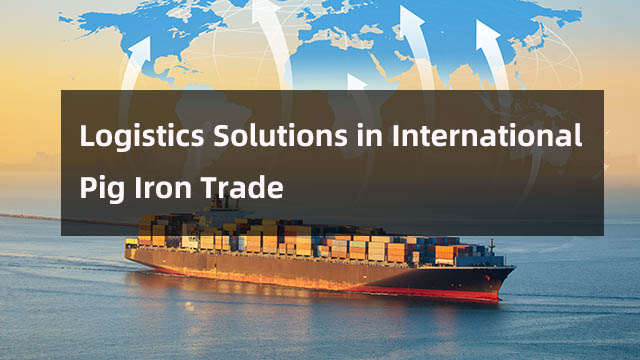Logistics Solutions in International Pig Iron Trade
2025-02-06 11:17:31 hits:0
Logistics Solutions in International Pig Iron Trade
In the context of global economic integration, international pig iron trade is becoming increasingly frequent. As a crucial basic raw material, pig iron's logistics plays a vital role in the smooth progress of trade. For enterprises like Tiegu, which provides pig iron and casting products to global users, efficient logistics solutions can not only reduce costs but also improve trade efficiency and customer satisfaction. Let's explore the logistics solutions in international pig iron trade and how they contribute to Tiegu's business development.

Selection of Transportation Modes
Sea Transportation
Sea transportation is the primary mode in international pig iron trade. For Tiegu, which exports a large amount of products, its advantages are obvious. It has a large capacity and low cost. A large bulk carrier can carry tens of thousands of tons, meeting Tiegu's long - distance transportation needs for large - scale products. When choosing sea transportation, factors such as shipping schedules, routes, and port handling efficiency need to be fully considered. The sea routes from major pig iron exporting countries like Brazil and Australia to importing regions such as China and Europe are already mature. Tiegu can use these routes to plan transportation routes reasonably, shorten transportation time, reduce costs, and ensure products reach global customers in a timely manner.
Railway Transportation
In some inland countries or regions, railway transportation plays an important role in pig iron logistics. For Tiegu's product transportation, the characteristics of railway transportation can also be fully utilized. It is faster and less affected by weather. For example, in Russia, railways are an important means to transport Tiegu's pig iron from production areas to ports. Through railways, Tiegu's pig iron and castings can be efficiently transported to sea - port for combined rail - sea transportation, expanding the transportation network and improving efficiency to meet the needs of different regions.
Road Transportation
Road transportation is highly flexible and suitable for short - distance transportation and cargo distribution. In the distribution of Tiegu's products from ports to end - users, road transportation is indispensable. It can provide door - to - door service to meet the diverse needs of global customers. However, road transportation has relatively high costs and limited capacity, so Tiegu needs to make comprehensive considerations in actual operations.
Warehousing Management
Port Warehousing
Ports are important hubs in international pig iron trade, and port warehousing is equally crucial for Tiegu. Port warehousing plays a key role in balancing supply and demand and ensuring the smooth flow of Tiegu's goods. A special warehousing area for Tiegu's pig iron and castings should be set up at the port, equipped with good ventilation, moisture - proof, and fire - prevention facilities to ensure product quality. At the same time, advanced warehousing management systems should be used to monitor and manage inventory in real - time, improving warehousing operation efficiency and ensuring the smooth turnover of Tiegu's products at the port for timely shipment to the world.
Inland Warehousing
In addition to port warehousing, setting up inland warehousing centers is also necessary, which has a positive impact on Tiegu's market expansion. Inland warehousing can be close to the consumer market, shortening the distribution time of Tiegu's products and reducing transportation costs. Moreover, inland warehousing can serve as a buffer warehouse to cope with fluctuations in market demand. When the demand for Tiegu's pig iron or castings suddenly increases in a certain area, inland warehousing can respond quickly and replenish goods in a timely manner.
Logistics Risk Management
Transportation Risks
In the logistics process of international pig iron trade, transportation risks cannot be ignored, especially for Tiegu's global product transportation. Sea transportation may encounter bad weather, pirate attacks, etc., and railway and road transportation may have traffic accidents. To reduce transportation risks, Tiegu should choose reputable and experienced transportation companies and purchase sufficient transportation insurance to ensure the safety of goods during transportation.
Warehousing Risks
There are also certain risks in warehousing, such as pig iron rust and theft. Tiegu's warehousing management also faces these challenges. To prevent these risks, it is necessary to strengthen the maintenance and management of warehousing facilities, install monitoring equipment, and establish strict warehousing management systems.
Supply Chain Collaboration
Collaboration between Traders and Suppliers
Close cooperation and information sharing should be established between traders and suppliers. As a supplier, Tiegu's collaboration with traders is particularly crucial. Tiegu should provide production progress and quality inspection information of pig iron and castings in a timely manner, and traders should arrange procurement plans and logistics transportation reasonably according to market demand.
Collaboration between Logistics Enterprises and Traders
Logistics enterprises should cooperate closely with traders and provide customized logistics services according to the needs of traders. For the transportation of Tiegu's products, logistics enterprises should fully consider Tiegu's actual situation from the design of transportation plans to the distribution of goods.
Logistics solutions in international pig iron trade are complex and systematic, involving transportation mode selection, warehousing management, logistics risk management, and supply chain collaboration. Enterprises like Tiegu, which provide pig iron and casting products to global users, can achieve efficient operation of international pig iron trade logistics and promote the sustainable development of their own businesses only by applying these logistics solutions scientifically and reasonably. In actual operations, Tiegu and all participants should continuously optimize logistics solutions according to their own situations and market changes to adapt to the increasingly fierce market competition, occupy a more favorable position in the global pig iron and casting market, and continuously provide high - quality products and services to global users.

 en
en  fra
fra  de
de  ru
ru  gle
gle  th
th  ara
ara  it
it  jp
jp  kor
kor  zh
zh 


